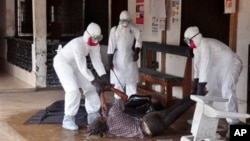The World Bank Group warns that the West Africa Ebola crisis could deal a huge economic blow to Guinea, Liberia and Sierra Leone unless swift action is taken
World Bank Group President Jim Yong Kim held a teleconference Wednesday to outline the economic effects of the Ebola epidemic.
“Our findings indicate that if the virus continues to spread the economic cost to these countries could grow eight-fold by 2015. This would deal a potentially catastrophic blow to their already fragile economies.”
Kim said the top priority is “to save lives and prevent new infections.” The bank has released $117-million in grant funding for the “immediate humanitarian response.”
But he said the SARS outbreak from 2002 to 2004 showed how a disease can hurt economies. SARs killed 800 people and caused $40-billion in economic losses. Kim said SARS and the H1N1 outbreak in 2009 taught that fear and aversion behavior caused up to 90-percent of the economic impact.
“The fear of contagion has helped fuel an economic crisis in the Ebola crisis as well. There are two kinds of contagion. One is related to the virus itself and the second is related to the spread of fear about the virus. Already the fear factor from the Ebola outbreak has reduced labor force participation, closed places of employment, disrupted transportation and motivated some government and private decision makers to close seaports and airports,” said Kim.
The World Bank Group head said the sooner the fear factor can be confronted the sooner the Gross Domestic Product losses can be contained.
“For 2014,” Kim said, “we estimate that the GDP losses to Liberia, Sierra Leone and Guinea from this crisis will be a combined $360-million, which is a huge portion of the overall GDPs of these small countries. We expect that the impact on government budgets to be $292-million.”
However, he said, next year, if there’s a rapid and effective response, the combined cost to economic output could be as low as $97-million. But he warned, if the spread of the virus is not checked by an “immediate massive effort,” the economic toll could reach $800-million in 2015.
The World Bank assessment focused only on Liberia, Guinea and Sierra Leone. But preliminary estimates indicate if the Ebola virus spreads to other African nations the impact could be many billions of dollars.
Dr. Kim said that “time is of the essence.” He said that the “best case scenario”—that is, getting the outbreak under control -- is “still not in sight.” That’s because there are not enough health workers or resources in the region.
Kim said it does not matter how many cases there are. What matters, he said, is how quickly the response is scaled-up.
“However many cases there are right now, if we get an effective response on the ground in the next few months, we can really blunt the vast majority – 80 to 90-percent – of the economic impact.”
He said an effective response could sharply lower the current death rate from Ebola of around 53-percent. He said while there’s no cure or vaccine, with treatments such as IV hydration and monitoring of electrolytes in the blood – such as potassium, calcium and sodium -- a “very high percentage” of infected people “could survive.”
Kim added the response just needs “more people, more money, more attention and more commitment.”





